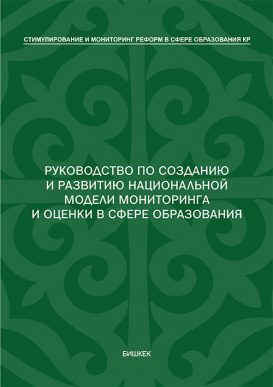The situation in the sector of education for stable development in Kyrgyzstan has an ambivalent nature. On the one hand, the interest in the issues of stable development rises in the world and our country also, countries declare of their commitment to the ideology of stable development, on the other hand, the economic difficulties pounced at the country, especially for the last years, impede redistribution of resources to the benefit of development, and moreover with the vector of stable development.
At the national level, the Kyrgyz Republic expressed its commitment to the ideology of stable development. The National Council for Stable Development was established at the Presidential level; the National strategy of stable development till the year of 2017, Program and Governmental Plan were adopted for its implementation. The issues of education for stable development are the key pillar as the success of movements in this conceptual framework will directly depend of the human potential, trained personnel at all levels so as governmental officials, politicians, businessmen, scientists, teachers etc.
On the other hand, establishment of integrated, complex ecological world outlook is a complicated process and requires a deep modification of the decision making system and education system as well. It requires the thorough understanding of such conceptual issues as: what person- citizen of Kyrgyzstan should the country obtain for successful development in the 21st century; what will be the development vector; how will the labor market change and what skills, knowledge and abilities will be required. All the questions should be decided as soon as possible as changes don’t allow time for blue study.
The review was prepared to analyze the situation in the dynamics of transition to education for stable development; to estimate the place and potential of the Kyrgyz Republic, reveal main complexities and elaborate recommendations to overcome them. Reports, methodical and regulatory legal acts, programs and development strategies of the Kyrgyz Republic were analyzed, employees of the Ministry of Education, Government Agency for Environment Protection and Forestry, teachers of higher education institutions, experts were interviewed, questioning of directors and school teachers was conducted in preparing the review.
The analytical report was prepared within the frameworks of the co-project of K.Adenauer Foundation and Ecological Movement “BIOM”- “Stimulation and monitoring of reforms in the education sector of the Kyrgyz Republic” implemented under support of the European Union. The project’s goal is to enhance the role and opportunities of the Public Council of the MES KR and experts’ community in the decision making system for reformation of the education system and improvement of reforms transparency for the society.












